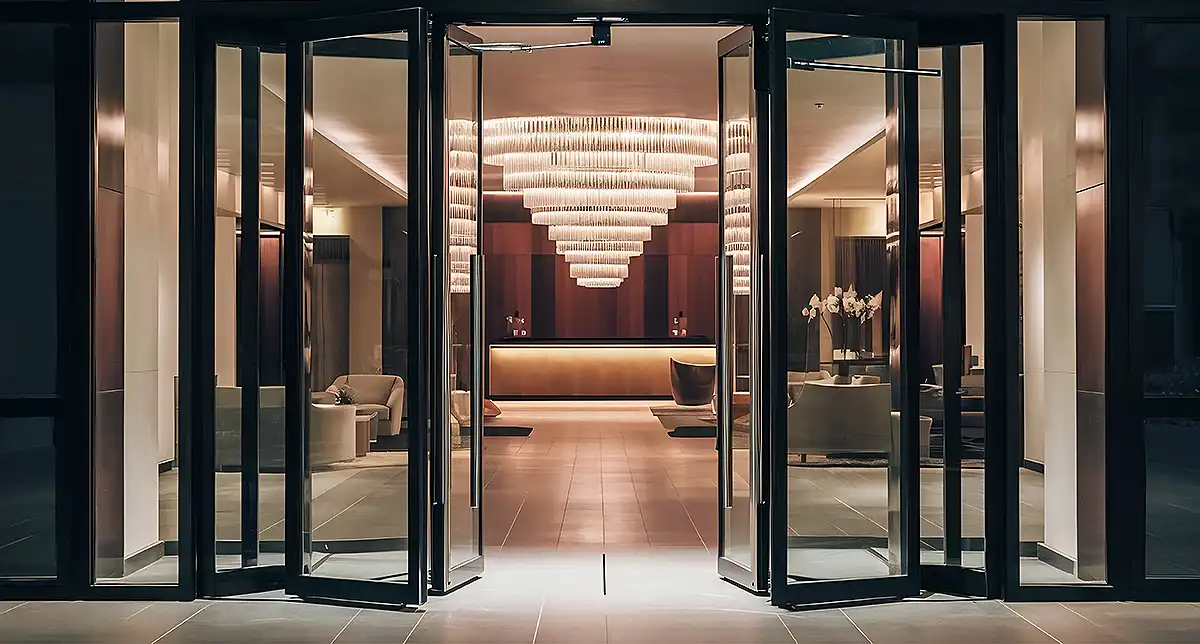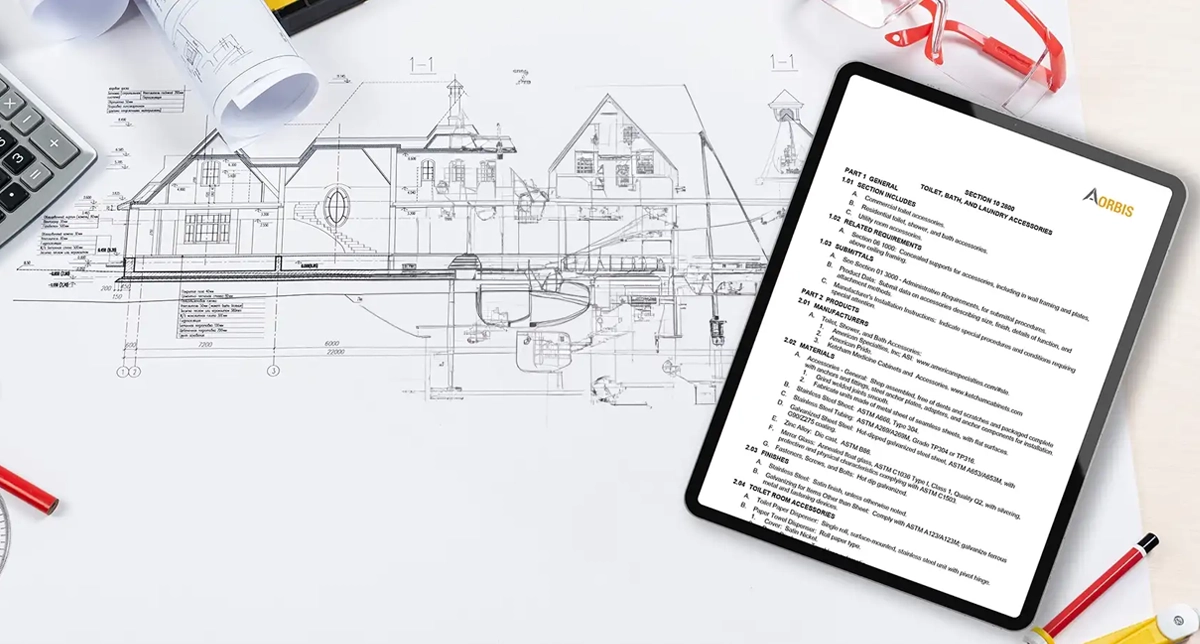Writing the Future with Architectural Specifications for Hospitality in Division 8
In the construction industry, especially in hospitality, getting architectural specifications just right is essential for creating spaces that are not only functional but also welcoming. The CSI MasterFormat provides a key framework for these construction specifications, ensuring every detail—whether it’s the foundation or the final touches—meets the necessary standards. Division 8, which focuses on Openings, covers everything from doors and windows to glazing systems and their related hardware. This division plays a critical role in ensuring these elements perform well, are safe, and enhance the overall aesthetic of the space.
In hospitality, where the guest experience is central to success, Division 8 helps architects, engineers, and builders create environments that are not just secure and functional, but also visually appealing. Whether designing luxury hotels, boutique resorts, or trendy restaurants, it’s vital to get the hospitality specifications right for doors, frames, and glazing systems. These elements must strike the perfect balance between style and practicality.
As guest expectations continue to evolve, so do the technologies that shape the built environment. Designers need to create spaces that are flexible and functional, ensuring they remain relevant and attractive for years to come. Division 8 specifications support this by helping to future-proof designs, making them durable and adaptable in an ever-changing market. Read till the end to know how these architectural specs contribute to the lasting success of hospitality spaces, showcasing the role of AORBIS in construction specification writing.
Designing Hospitality Spaces for Long-Term Relevance
The hospitality industry—think hotels, resorts, and restaurants—moves fast. Trends come and go, and guest expectations keep getting higher. To stay ahead of the curve, hotels need to design spaces that not only meet the needs of today’s guests but also stay relevant as those needs evolve. A key part of making this happen is getting the architectural specifications right. These are the detailed guidelines that define how a building should be constructed and how it can adapt to future changes, whether that’s new technology, shifting trends, or evolving guest preferences.
One crucial part of these construction specs is Division 8, which covers doors, windows, and related hardware. This section may sound technical, but it’s vital for creating flexible, functional, and attractive spaces. When Division 8 is done right, it ensures that the materials and systems chosen today will continue to perform well in the future and can easily be updated or adjusted as new trends or technologies emerge.
AORBIS is a company that specializes in writing these kinds of hotel specifications. They work with architects and contractors to design buildings that are built to last, handling billions of dollars in proposals each year. By focusing on Division 8, AORBIS ensures that hospitality spaces are not only practical and aesthetically pleasing today but are also flexible enough to evolve with whatever the future holds.
Key Principles for Long-Lasting Division 8 Specifications
When designing hospitality spaces like hotels or resorts, there are three key principles that help ensure the design remains practical and effective for years to come: adaptability, durability, and modularity.
Adaptability
One of the most important things to consider when designing spaces that will stand the test of time is adaptability. Technology is always evolving, and what works today might quickly become outdated. This is particularly true for things like doors and hardware, where innovations like smart locks and keyless entry systems are becoming the norm.
Flexible Specifications for New Technologies
Adaptable Division 8 specifications make it easier to integrate new technologies down the road. For instance, if a hotel wants to switch to smart locks or keyless entry, where guests can unlock doors with their phones, the right architecture specifications ensure that this transition is seamless. By choosing door hardware that’s compatible with digital platforms and mobile keys now, hotels can upgrade their security systems in the future without having to redo everything from scratch.
Designing for Easy Upgrades
It’s also smart to design door systems with future upgrades in mind. For example, biometric access, like fingerprint or facial recognition, is becoming more common in hospitality. If a hotel’s doors are designed to easily accommodate these kinds of systems, they can upgrade their access technology without replacing entire door systems. This kind of forward-thinking design keeps hotels flexible and ready to adapt to the latest tech, making them more future-proof and able to meet changing guest expectations.
Durability
Durability is essential when designing spaces that will stand up to heavy use, especially in high-traffic areas like hotels. Doors and hardware are constantly in use, so they need to be strong enough to withstand daily wear and tear. Choosing durable materials helps these systems last longer, saving time and money by reducing the need for repairs or replacements.
High-Quality, Wear-Resistant Materials
Selecting materials that are built to last is key. For example, wooden doors made from high-quality hardwood or solid-core construction are far more durable than cheaper alternatives. These materials hold up better under the constant use typical in hotel environments. Additionally, doors with wear-resistant finishes—like special coatings—help maintain their appearance over time, even with heavy traffic.
Cost-Saving Benefits
While durable materials may come with a higher upfront cost, they’re actually a smarter investment in the long run. By choosing materials that last longer and require less maintenance, hotels can reduce the costs of repairs and replacements down the road. This helps keep maintenance budgets in check while ensuring the space continues to meet high standards for guest experience. In the end, investing in durability not only benefits the hotel’s bottom line, but also enhances the guest experience by maintaining quality and reliability over time.
Modularity
Modularity in door systems and hardware means designing components that can be easily swapped out or upgraded over time. This approach makes it simple to update or improve the system as new technologies emerge, ensuring the space stays functional and up-to-date.
Modular Locking Systems
Take hotel locking systems, for example. As technology evolves, many hotels want to upgrade their locks to keep up with the latest trends, like smart locks or keyless entry. Modular locking hardware lets hotels replace just the locking mechanism itself, without needing to overhaul the entire door system. This saves both time and money, while ensuring the hotel stays current with the newest security features—keeping things fresh and secure without major disruptions.
Choosing Innovation-Ready Door Types and Hardware for Hospitality
The requirement for advanced technology in the hospitality sector is on the rise, therefore, it is necessary to make a decision on the doors and hardware that will cater to the innovations and at the same time preserve the design.
Smart Locks and Access Control
Electronic locks and various access control systems are increasingly being used in hospitality design. These technologies offer mobile check-in, mobile keys, and guaranteed distribution that is contactless, which plays a crucial role during the post-pandemic period.
Integration of Digital Platforms
Whenever you write Division 8 specifications for hospitality, it is vital to make sure that doors and hardware are compatible with the new digital platforms and mobile apps. This strategy helps the hotels to be always in trend and guarantees an easy rich experience to the guests.
Interoperable Components
It is extremely important to pick the hardware that can be perfectly in tune with other brands and systems. The installation of operable door components will mean that future upgrades or system changes will not necessitate a major overhaul of the door hardware. This feature offers the possibility of shortening the time and cost in the long-term and making future renovations easier.
Eco-Friendly Options
More and more it is becoming important for both hospitality brands and guests to be sustainable. Several hotels are mainly focusing on eco-friendly materials to decrease their ecological footprint and to procure sustainability-oriented customers.
Sustainable Door Materials
When specifying wooden doors, consider the use of recycled material or wood that has been sustainably sourced. DEURCO, a leading manufacturer of high-quality wooden doors, offers eco-friendly options that meet environmental goals without sacrificing quality or design.
Designing Hotel Doors and Hardware for Future Growth
As the hospitality industry evolves, it’s essential for hotels to plan ahead when it comes to door and hardware systems. By considering future technological advancements and changing business needs, hotels can ensure their infrastructure remains efficient and adaptable.
Flexible Infrastructure
When selecting hotel doors and security systems, it’s important to invest in solutions that can easily adapt to future upgrades. For instance, systems that support biometric access, like fingerprint recognition, or AI-driven security features, can help hotels stay ahead of the curve as technology continues to evolve.
Open-Source Systems
Opting for open-source technology allows hotels to avoid being locked into a single vendor or provider. This flexibility makes it easier to integrate new technologies or update systems down the line, ensuring the hotel stays competitive and doesn’t get stuck with outdated solutions.
Timeless Design
The aesthetic appeal of hotel doors and hardware is just as important as their functionality. By choosing designs that align with the hotel’s brand but also have a timeless quality, hotels can ensure that their spaces remain attractive and relevant for years to come, without the need for constant redesigns. This combination of beauty and durability is key to long-term success.
Partnering with Manufacturers to Stay Ahead of Innovation
To stay competitive in the fast-evolving hospitality industry, it’s essential to collaborate with manufacturers who are constantly pushing the envelope with new products and ideas.
Access to the Latest Technology
Working with innovative manufacturers ensures your hotel’s designs feature the most advanced door and hardware systems on the market. Whether it’s smart locks, eco-friendly materials, or next-level security features, partnering with companies focused on innovation gives you access to the latest technology, keeping your hotel ahead of the curve.
Custom Solutions for Hotels
Every hotel has unique needs, and some projects require specialized, custom features. Collaborate with manufacturers who offer tailored solutions, including custom wooden doors or sophisticated security systems, to ensure the space not only reflects the hotel’s brand but is also adaptable to future advancements. This customization helps your hotel stand out while ensuring long-term functionality as technology continues to evolve.
Case Study: Hotel Renovation Project
Project: Hotel Renovation Project
Location: Framingham, MA
Size: 155,000 sq. ft.
Value: $13 million
Architect & Engineer: Russell and Dawson
AORBIS Role: Supplier of Division 8 Products (Doors, Windows, and Other Building Openings)
Project Overview
In 2024, an upscale hotel in Framingham, Massachusetts, underwent a major renovation to breathe new life into its outdated design and facilities. Originally built in 1969, the hotel—spanning 155,000 square feet—was ready for a fresh look and upgraded amenities that would appeal to modern guests. The $13 million renovation aimed to transform the space into a more stylish, energy-efficient destination while preserving the comfort and service that loyal patrons loved.
The renovation was led by the architectural and engineering firm Russell and Dawson, who handled everything from structural updates to more sustainable features, such as energy-efficient lighting and water-saving systems. Their goal was not just to update the hotel’s aesthetic, but to make it more environmentally friendly and functional for the future.
AORBIS played a key role in the project as a supplier of Division 8 products—essential building materials like doors, windows, and other key openings. These elements were central to the hotel’s modern redesign, helping to create both an inviting atmosphere for guests and a more sustainable, energy-efficient building overall.
Challenges
Renovating an older building always comes with its challenges, and this project was no exception. The hotel, originally built in 1969, needed to preserve its original structure while upgrading its design, safety features, and energy efficiency. One of the toughest hurdles was finding materials—like doors, windows, and hardware—that were both stylish and eco-friendly, while still meeting modern safety standards and ensuring accessibility for all guests.
AORBIS Division 8 Solutions
To tackle these challenges, the hotel turned to AORBIS for their Division 8 solutions—specialized building materials for doors, windows, and other critical openings. These materials had to be durable, energy-efficient, and meet strict safety requirements. Here’s what AORBIS provided to help make the renovation a success:
Custom Doors and Frames: AORBIS supplied high-quality, energy-efficient doors and frames that fit seamlessly with the hotel’s updated design. These doors were also built to handle high-traffic areas, ensuring durability over time.
Energy-Efficient Windows and Glazing: AORBIS provided windows with special glazing that helped keep the building comfortable year-round—cool in the summer and warm in the winter. This not only improved the guest experience but also reduced energy consumption, lowering heating and cooling costs.
Specialty Hardware: Accessibility was a key consideration. AORBIS supplied ADA-compliant hardware, including door handles and locks that ensured the hotel was accessible to all guests. At the same time, the hardware complemented the modern aesthetic the hotel was aiming for.
Fire-Rated Solutions: Safety is always a top priority in hotel design. AORBIS also provided fire-rated doors and frames, helping the hotel meet local safety regulations and ensuring peace of mind for both guests and staff in the event of an emergency.
Results and Impact
Thanks to AORBIS’ high-quality products, the hotel was able to meet its design and sustainability goals while creating a safer and more comfortable environment for guests. The impact was felt in several key areas:
Energy Savings: The energy-efficient windows and doors helped reduce the building’s heating and cooling costs, supporting the hotel’s sustainability initiatives and contributing to long-term cost savings.
Sustainability: The materials supplied by AORBIS aligned with the hotel’s eco-friendly goals, helping to minimize water usage and reduce the building’s overall environmental footprint.
Guest Experience: The stylish, high-performance doors, windows, and hardware elevated the hotel’s look and feel, resulting in a more comfortable and pleasant experience for guests.
Safety and Accessibility: With the fire-rated doors and ADA-compliant hardware, the hotel ensured that it met all safety requirements while being accessible to everyone.
Client Testimonial
“Working with AORBIS on our Division 8 supplies made a huge difference. Their expertise not only helped us achieve our design and sustainability goals, but also ensured the hotel was safer and more comfortable for our guests.” — Russell and Dawson Project Team
The Bottom Line
When designing spaces for hotels, restaurants, and other hospitality venues, Division 8 construction specifications are a key consideration. These architecture specs focus on critical elements like doors, windows, and hardware, all of which are essential for creating spaces that are functional, durable, and visually appealing. As technology evolves and guest expectations shift, it’s important to design these features in a way that allows them to adapt to future needs.
By selecting high-quality materials and planning with the future in mind, architects and designers can ensure the spaces they create remain stylish and functional for years to come. This proactive approach helps hospitality businesses deliver exceptional guest experiences while staying competitive in an ever-changing market.
If you need expert guidance on creating Division 8 hospitality specifications, AORBIS is here to help. Our architectural spec writing services ensures your designs stay current with the latest trends while being flexible enough to meet future demands, helping you build spaces that stand the test of time.
FAQs (Frequently Asked Questions)
1. What to consider when writing 8 hospital building construction specifications?
Hospital buildings must adhere to rigorous guidelines to ensure the safety, cleanliness, and accessibility of the environment for patients, staff, and visitors. The following are key considerations for various components of the building:
• Metal Doors and Frames (Section 08100)
• Wood and Plastic Doors (Section 08200)
• Windows (Section 08500)
• Hardware (Section 08700)
• Glazing (Section 08800)
2. What are the important aspects of division 8 hotel building construction specifications?
Important aspects Division 8 hotel building construction specifications include:
• Entrances, Storefronts, and Curtain Walls (Section 08400)
• Interior Aluminum Doors and Frames (Section 08125)
• All-glass entrances and Storefronts (Section 08421)
• Hardware (Section 08700)
• Glazing (Section 08800)
3. How to get division 8 hotel chain specifications?
Hotel chains have design standards to maintain consistency across locations.
Here’s how to get Division 8 hotel chain specifications:
1. Contact the Corporate Design Department: Request Division 8 specifications for design guidelines.
2. Review Brand Standards Manuals: These manuals outline architectural styles, finishes, materials, and procedures.
3. Consult Approved Vendors: Work with trusted suppliers familiar with the brand’s requirements.
Ensure compliance with local building codes, accessibility standards, and operational needs for safety and functionality while maintaining brand consistency.
4. Where can I find a professional division 8 hospitality specifications company?
AORBIS Inc. specializes in creating detailed construction specifications, focusing on Division 8 (Openings) and Division 10 (Specialties), primarily for hotel projects. We offer:
• Code Compliance: Ensuring all specifications meet current building codes.
• Design Development Support: Converting complex designs into clear construction instructions.
• Technical Project Support: Advising on materials, performance standards, and specifications.
• Door Hardware Specification Writing: Tailored specifications for hotel projects.
• Hardware Submittal Review: Ensuring hardware meets quality standards.
• Quantity Calculations: Precise calculations for Division 8 and 10 to keep projects on track.
Partnering with AORBIS ensures your hotel project meets industry standards and specific needs. Visit our website or contact us for more information.

![Complete List of Construction Specifications Terms [Ultimate Reference Guide 2025]](https://www.aorbis.com/wp-content/uploads/2025/04/Complete-List-of-Construction-Specifications-Terms.png)



